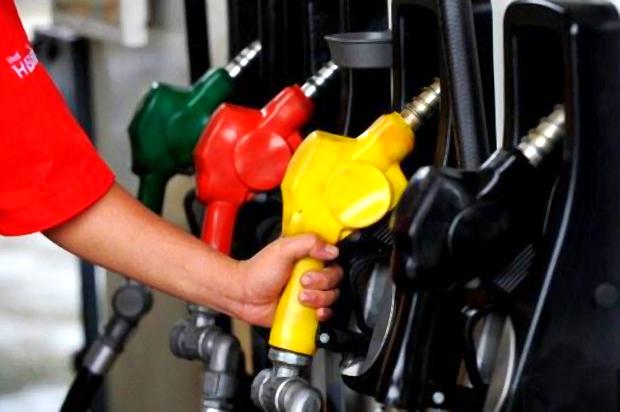
Fuel pumps. INQUIRER stock photo
With more expensive oil, the government so far generated P3 billion in excess of its value-added tax (VAT) collection program as of end-February, which will fund the additional fuel subsidies and discounts to be given away next month.
Finance Undersecretary Valery Joy Brion told a Senate hearing on Monday that excess collections from 12-percent VAT during the first two months of 2022 and beyond would fund the larger subsidies proposed by President Rodrigo Duterte’s economic team to provide relief to sectors badly hit by skyrocketing global oil prices amid the Russia-Ukraine war. “Additional subsidies are also being studied from additional VAT collections,” she said.
The excess VAT collections were generated at the average crude oil prices of $83.5 per barrel last January and a higher $90.1 a barrel in February, Brion told Sen. Sherwin Gatchalian, who chairs the Senate’s energy committee. These actual incremental collections were based on the baseline oil cost of $70 per barrel, she added.
Brion said that if the global oil prices hovered above $100 per barrel, excess VAT collections would reach up to $20.3 billion for the entire year. She said these extra revenues could fund more subsidies if ever elevated fuel costs get prolonged.
READ: Double-digit fuel price hike expected this week
VAT and import duties were being slapped on the value of imported goods; as such, more expensive oil imports would also yield bigger tax collections for the government, especially the Bureau of Customs (BOC). Last year, the oil excise tax take amounted to P143.9 billion, Brion said.
Brion, who’s officer-in-charge of the Department of Finance’s (DOF) domestic finance group, was referring to the total of P6.1 billion in subsidies and discounts that the government wanted to give away to public utility vehicle (PUV) drivers as well as agricultural producers.
READ: Additional P600-M fuel subsidy for farmers, fishers
Last week, the Department of Budget and Management (DBM) already released a total of P3 billion — P2.5 billion for PUV drivers’ subsidies and P500 million for farmers’ and fisherfolks’ discounts. These releases came from the agency budgets of the Department of Transportation (DOTr) and the Department of Agriculture (DA), respectively, which had been set aside in the P5.02-trillion 2022 national budget.
READ: Around 136,000 jeepney drivers to receive fuel subsidies by Tuesday
The Economic Development Cluster (EDC) last week pitched to Duterte a doubling of the fuel subsidy to P5 billion while granting up to P1.1 billion in fuel discounts. The second tranche of financial support to vulnerable sectors was planned to be released in April after the government has identified funding sources, Socioeconomic Planning Secretary Karl Kendrick Chua said last week. Excess revenues and foreign borrowings usually financed unprogrammed appropriations in the yearly budget.
However, Brion reiterated the DOF’s position that oil excise taxes cannot be suspended as it would slash revenues needed to finance economic rebound post-pandemic.
READ: Revenues from tax-paid oil hit P367.3 billion
“The DOF does not support the various proposals to lower or suspend fuel excise taxes, because this will translate to significant foregone revenues. And this will be detrimental to our recovery and long-term growth. However, the government remains ready to provide targeted relief assistance and support to address the impact of the oil price hike on affected sectors, especially the PUV drivers, farmers, and fisherfolk,” Brion said.
READ: ‘Filipinos are suffering’: Drilon sees no legal obstacle for gov’t to halt fuel excise tax
In 2021, the DOF said that suspending oil excise taxes, being imposed by the Tax Reform for Acceleration and Inclusion Act (TRAIN Law) since 2018, would deprive the government of up to P147.1 billion in revenues this year.